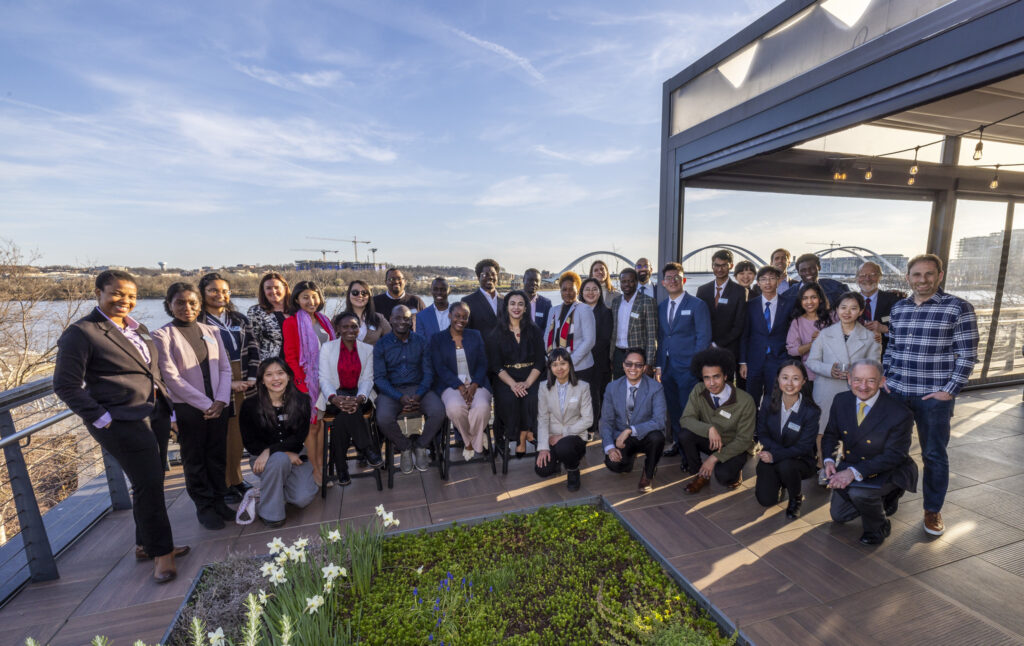This spring, McDonnell Scholars from the 2022 and 2023 cohorts visited the nation’s capital to experience first-hand Washington, D.C.’s political and cultural landscape, expand their professional network, and build personal connections through their shared experience. Joining them on the trip were founding benefactor, John McDonnell, and Chancellor Emeritus Mark Wrighton, both of whom remain actively engaged with the Academy.
Washington, DC: A monumental recall
Author: VaNetta Clark, PhD Candidate, Cohort 2023
Research reveals that our memories – individually and collectively – are substantive in how we conceptualize our experiences, construct our lives – and shape our identities. I recall receiving the distinct opportunity of being invited to the White House as a 5th-grade student, along with my 4th-grade teacher, Mrs. Tabb, and the school’s principal. I have retained vivid images of standing in the ballroom as my eyes glide over what appears to be a sea of students, teachers, educational leaders, and delegates from all around the country. Cameras seemed to flash incessantly! We were all there as honorees to represent the success of effective leadership strategies, which included authentic solutions to real-world problems, particularly in our school communities. In addition to the award ceremony, a tour of historic monuments would ensue. As the only student selected from my school to attend, my identification with leadership would begin early in life. Where I come from, dreams are often deferred, Langston Hughes (1951) – or rarely actualized, yet this experience would weave for me a bigger dream of exceptional leadership opportunities. Due to an unforeseen emergency, however, the tour abruptly ended, and we were informed the President had been rushed out of the country. Years later, I realized, that the moment had sown a seed, and I have often contemplated under what circumstances I would return to Washington, D.C.
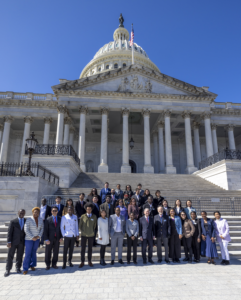
During the Spring 2024 semester, McDonnell Academy Scholars visited the Capital as part of the program’s initiative to cultivate the skills essential for global leadership. In addition to touring historic monuments, we engaged in workshops and lectures, which included a discussion of empirical experiences from two fellows from the American Association for the Advancement of Science (AAAS); a courtroom lecture in the Supreme Court; presentations from former and current White House Correspondents, Associate and Senior Fellows, and Senior Research and Advocacy Advisors at The George Washington University, Elliott School of International Affairs on international topics such as Policy Advising, Foreign Policy, and Nuclear Politics. In addition to insightful discussions, Scholars were provided a lens through which we can contemplate the role of diplomacy; respond to shared challenges globally; and explore economic policy. With each presentation, I became more aware of the impact of informed leadership practices and their influence on shaping our world’s trajectory and fostering meaningful change. I conceptualized my ability to become an active participant in the development of policy for the longevity and sustainability of our educational communities and the planet.
In addition to professional development and exploring the influences of global leadership, we created lasting memories of laughter over shared meals, competitions – and even huddling together in the cold. We listened attentively to one another’s aspirations and uncertainties. We heard words of wisdom and inspiration from John F. McDonnell and Chancellor Emeritus Dr. Mark Wrighton. Most importantly, we learned what it means to be a McDonnell Academy Scholar for life.
In many ways, this Washington, D.C. trip was a momentous return to a journey that began years ago, and it holds for me, the answers to my former contemplation.
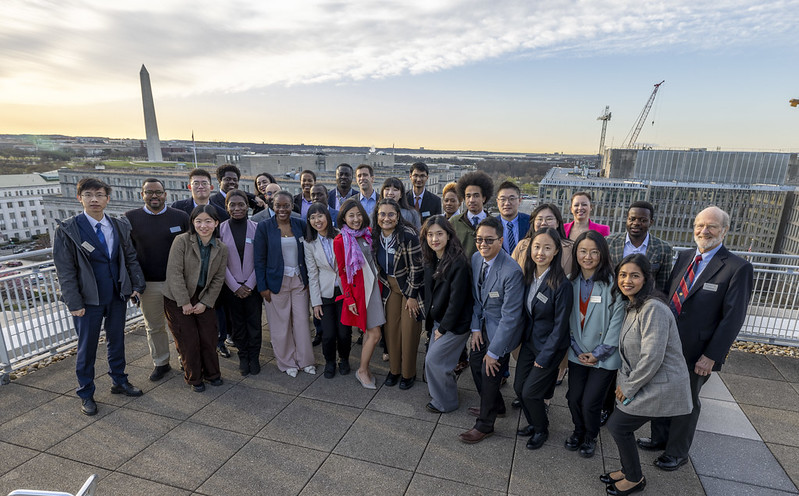
View photos from our Washington, DC trip on Flickr
Some Key Take Aways
During the 3-day program, the Scholars visited the U.S. Senate, and the Supreme Court, and toured historic landmarks and museums. Discussions hosted on the campus of George Washington University brought together government officials, press correspondents, and foreign policy experts to share diverse perspectives and career advice. The Scholars also connected with WashU alumni in D.C. during a special reception and enjoyed dinner at District Winery, hosted by Olin Business School alumnus Brian Leventhal.
Nick Saab, associate vice chancellor for federal relations for WashU, shared why it is important for the university to have permanent representation in the nation’s capital. Noting that the National Science Foundation is set for a budget cut of 8%, he emphasized the need to advocate for funding for specific areas in science and technology, as well as to build relationships that can help insulate WashU from the kinds of attacks that other universities have experienced recently.
Sophia Chan and Will Murray, American Association for the Advancement of Science (AAAS) congressional science & technology policy fellows, explained how in their roles as science policy fellows they can shape policy. They also shared lessons on science communications and advocacy. For example, Murray noted that an essential skill is the ability to translate complicated and highly technical language in terms that even a 5-year-old can understand. They also reflected on how they tailor different messages to different audiences, how they interface with lobbyists and talked about how priorities are defined based on state interests, what is politically viable at a given moment, and how that can change over time. They also offered advice to the Scholars on work-life balance and the importance of finding good mentors.
Chris Bracey, provost of George Washington University, who spent eight formative years of his career at WashU Law, kicked off a day of presentations on GWU’s campus with an introduction and remarks on recent trends in higher education. He reflected on the increasing pressures on academic freedom and emphasized the importance of having open debates and difficult conversations on campus and the role of programs like the McDonnell Academy in contributing to the diversity of thought and experience. As a legal scholar, Bracey warned against commonly held assumptions about the right to vote and a peaceful transition of power, noting that “The U.S. Constitution is not a given.”
Matan Chorev, principal deputy director of the U.S. State Department’s policy planning staff, explained that we are at an inflection point in history, and the U.S. is adjusting its strategy, recognizing that many of the assumptions that animated foreign policy in the past no longer hold. Instead of a period of extended geopolitical quiet, we have “intense and enduring strategic competition” with China and Russia and a much more multipolar world, with emerging powers that can shape international affairs. Rather than assuming a period of international cooperation around shared challenges, the international system is fractured and fragile. Instead of the world coming together on economic development and lifting people out of poverty, currently, there are questions about the limits of markets to deal with public good challenges. While we expected to see more political openness, today we are in a second decade of a democratic recession, amplified by technological developments. Therefore, advancing the U.S. vision of a free, open, secure, and prosperous world requires some foundational strategic adjustments. For example, Chorev noted that “Everything we do abroad must safeguard and accelerate our domestic renewal.” He stressed the need to treat both strategic competition and shared challenges as equal and emphasized U.S. willingness to work with any country (both democratic and non-democratic) and build “fit-for-purpose coalitions.”
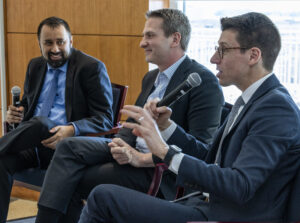
“If we are living in different realities based on where we’re getting our information, we’ll never be able to solve those problems…”
Schultz
Reflections on Leadership and Career Stories in Washington DC
By Loreina Hsien, MSW candidate, Cohort 2023
The most memorable moment of the trip to Washington D.C. was when we shared dinner at the winery run by our WashU alumnus. John McDonnell and Mark Wrighton shared the journey of how the McDonnell Academy was founded, initially facing challenges. It was heartening to reflect on the development of the idea of “global leadership” over 18 years, and its life-changing impacts on countless individuals, families, and communities. I was empowered by their encouraging engagement, believing in our ability to make positive changes in the world.
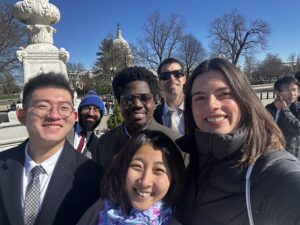
My biggest takeaway from this trip was learning about the career stories of Jonathan Greenberger (Washington Bureau Chief and Vice President, ABC News), Mahsa Rouhi (Associate Fellow, Strategy, Technology and Arms Control), Ali Wyne (Senior Research/Advocacy Adviser, International Crisis Group), and Alyssa Ayres (Dean, Elliott School of International Affairs, George Washington University). They shared how they explored various disciplines and pursued their passions to reach where they are today. Their stories of making tough decisions, adjusting goals, and reaffirming purposes and values inspired my leadership journey, compelling me to pursue career paths that are fulfilling, meaningful, and exciting.
Aamer Madhani, White House correspondent for Associated Press, and WashU alumni Eric Schultz, senior advisor to former President Obama, and Jonathan Greenberger, vice president and DC bureau chief of ABC News, joined the Scholars for a lively conversation on politics and the media. Each of them traced their professional journey, and what inspired their passion for journalism, and shared some important life lessons with the Scholars. Madhani advised them to “find what you love and live within your means.” Echoing this, Greenberger urged the Scholars to “find work that you find personally meaningful.” They also stressed the importance of building relationships with people and how those relationships can shape one’s career journey later in life. Schultz also noted that “those who succeed have a no-job-is-too-small mentality.” He advised the Scholars to be diligent and conscientious in everything they do, even if early in their career they may be assigned a task that doesn’t match their skillset.
Schultz shared his concern about what he believes is “the biggest challenge of our time” – how people are consuming information. “If we are living in different realities based on where we’re getting our information, we’ll never be able to solve those problems,” said Schultz. To counter the treats posed by misinformation and the deterioration of trust, he advocates for educating young people in media literacy.
Greenberger discussed how his network is adapting to different platforms (e.g. podcasts, streaming, social media, website), which means “we get to tell a story in five different ways, meeting our audiences where they are.” He also spoke about AI applications in his work, such as Dataminr, which serves as an “early warning system” that sends real-time alerts on global events, for example picking up the first tweet about a plane crash. Another example of an application is mining AI to get a sense of how a presidential candidate might respond to a question in a debate.
Reflecting on the challenges of the profession, Madhani discussed the trauma from his experience in Iraq and juggling personal issues with the paper’s deadlines. Greenberger also stressed the importance of making space for people to talk about mental health. He recounted, for example, the traumatic events on January 6th when his ABC crew was forced to hide in a closet from the mob storming the U.S. Capitol. Schultz noted that the COVID-19 pandemic was another example of the public service that reporters perform under increasing risk.
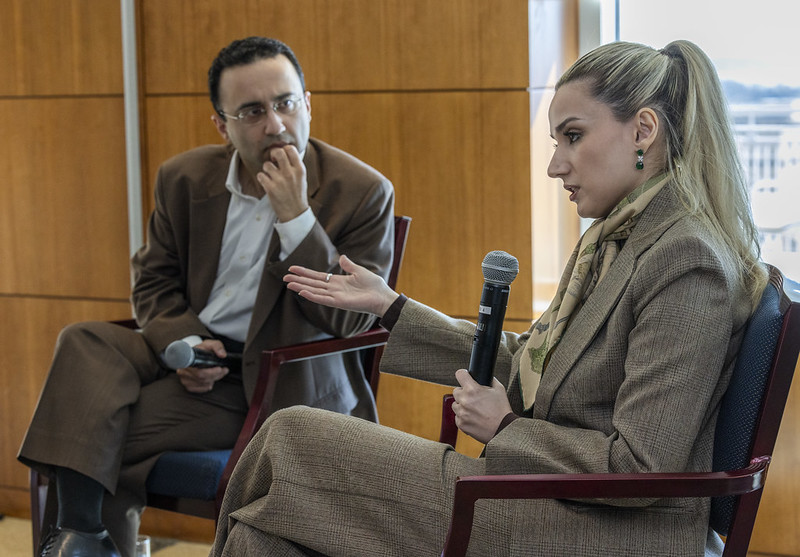
“the best way to deal with both friends and enemies is to understand how they see us….”
Rouhi
Mahsa Rouhi, a research fellow at National Defense University, and Ali Wyne, senior research and advocacy advisor, U.S.-China at International Crisis Group, shared their expertise on current challenges in foreign policy, including nuclear non-proliferation, the Middle East, and U.S.-China relations. They both highlighted the importance of people-to-people interactions and of not losing sight of the real human impact of foreign policy decisions. They stressed the need to move away from abstract concepts, to humanize policies, and to provide cultural context. They also highlighted the need for “strategic empathy” or the ability to put yourself in the shoes of your interlocutor, as well as the ability to transition between multiple contextual languages (strategic and humanities), placing different emphasis depending on your interlocutor.
Wyne identified 2008-09 as an inflection point in China’s resurgence and the U.S.-China relationship. In his new role at Crisis Group, he is focusing on advocating for policies to reduce catastrophic risk, creating a greater political constituency for diplomacy, and putting more “flesh on the bone” around concepts like “managed competition” to have a sense of clarity about the desired outcomes. He credited diplomatic efforts in the last year and the Biden-Xi meeting in San Francisco, for stabilizing the U.S.-China relationship. He reminded the scholars that “while structural forces exist, so does human agency,” and war is not inevitable. To walk back from the brink, he stressed the need to remind individuals about how catastrophic a war would be and how we would all lose our ability to live and function.
Rouhi traced her personal journey from growing up in Iran to the Pentagon, noting that “human connections” were always a big part of finding professional opportunities and overcoming barriers. An important life lesson for her has been not to compare herself to others but rather to focus on her unique strengths. For example, while some may publish prolifically, others will write just one book that transforms the field. Rouhi recognizes her strong suit is in making human connections and bringing people together on the negotiating table. When she convenes Track II diplomatic activities, her process is “much like making a movie.” She thinks carefully about the personalities in the room and the story she is trying to tell. In her current role advising senior military officials, she often applies her knowledge of the language and cultural context and advises that “the best way to deal with both friends and enemies is to understand how they see us.” For example, in her day-to-day work, she follows Iranian media representing different factions because reading about the extremes and opposing views is helpful context. Rouhi also talked about our natural resistance to change and common assumptions about an eventual “return to normal” or the previous status quo. She, however, sees broader geopolitical shifts that mean the world is “not going back to how things were” and is entering a period of an arms race rather than arms control.
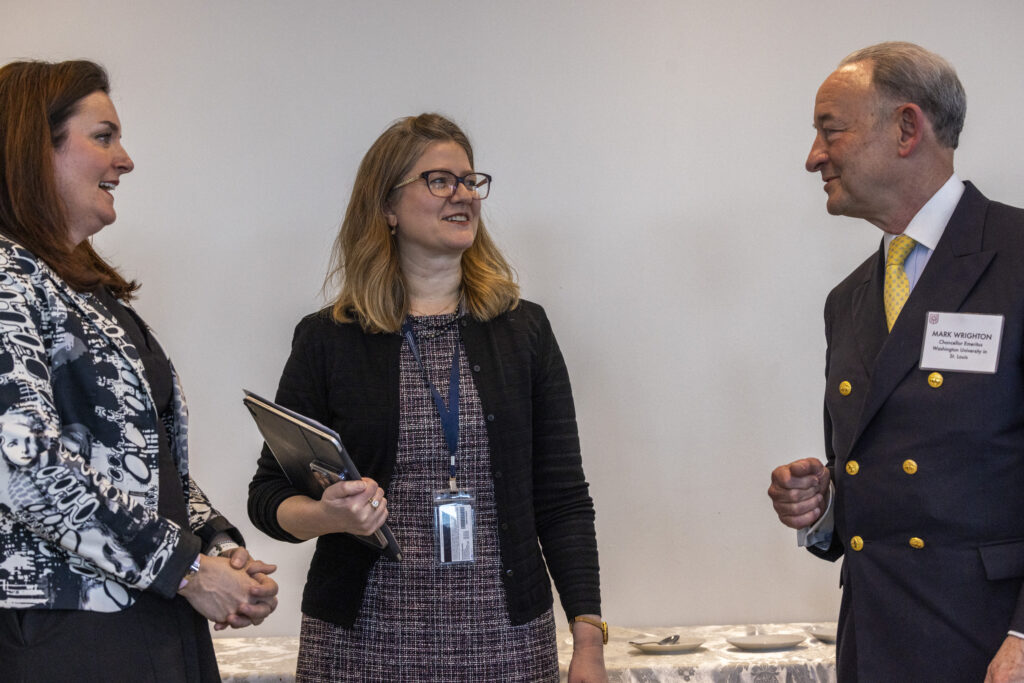
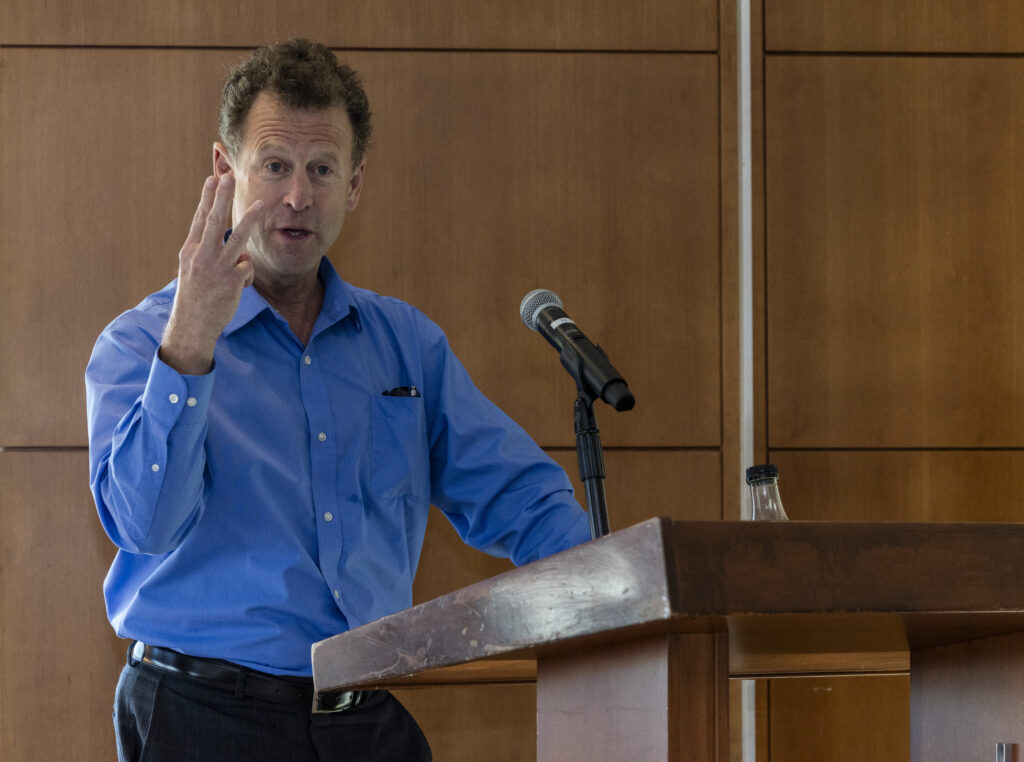
Alyssa Ayres, Dean of the Elliot School of International Affairs, shared her leadership experience with us. As the first female dean of the Elliot School, she brings a wealth of knowledge and experience in foreign policy specifically in India, Pakistan and South Asia regions of the world. She is testament that not all career paths are linear. Dean Ayres started her career as a cultural historian, published a book and then served as the deputy assistant secretary of state for South Asia for 3 years. A role that had not been in her original plan, but aligned well with her work at the Council for Foreign relations and as a senior advisor to an international strategic advisory group. As dean, she understands the importance of education, global connectedness and the ever-increasing importance of international affairs.
Michael O’Hanlon, Senior Fellow & Director of Research – Foreign Policy at the Brookings Institution is a regular fixture on our DC agenda. This year, Michael framed his conversation around the changes in democracy, freedom, and poverty across the world over the last 40-50 years. He cited the Freedom House work which rates people’s access to political rights and civil liberties in 210 countries. He reminded us that we are actually in aggregate more “free” with a lower percentage of people living in poverty than 50 years ago. In an increasingly polarized and populist world, this conversation reminds us why we continue to support programs like the McDonnell Academy that open up the dialog across cultures, disciplines and people to continue to make progress for people all over the world to have safer, secure and prosperous futures.
